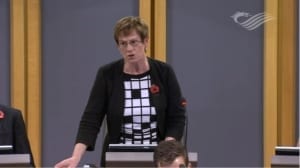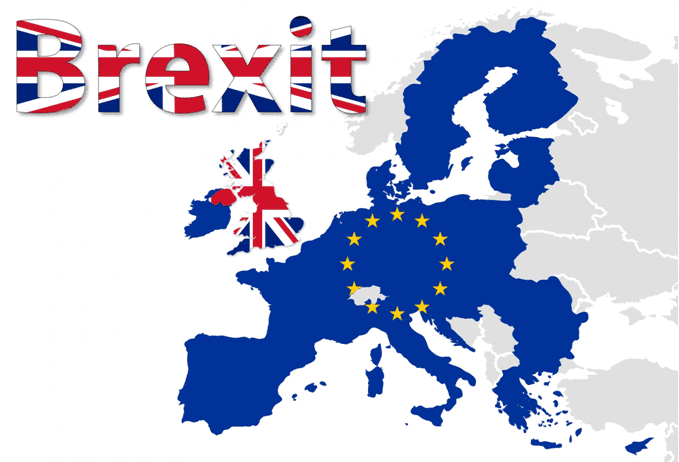UK Government withholds ‘Brexit energy price hike’ information from Welsh ministers
The UK Government has refused to share its assessment of the impact of Brexit on energy prices, the Welsh Government has revealed.
Questioned about fuel poverty by Labour’s Joyce Watson at the Senedd on Tuesday (19 Feb), energy minister Lesley Griffiths said the UK Department for Business, Energy and Industrial Strategy (BEIS) has assessed the likely scale of price increases after Brexit – but has not shared that information with Wales.

Mrs Watson, who represents the Mid and West Wales region, went on to warn that a ‘no deal’ Brexit would hit Wales’ energy sector, centred at Milford Haven. She also asked the minister to lobby the UK government on the issue of Energy Performance Certificates (EPCs), which unfairly penalise off-grid gas properties in rural areas, she said. The minister said she would raise Mrs Watson’s concerns at the next intergovernmental meeting.
Below is a transcript of the exchange.
Joyce Watson AM:
“Thank you, Minister, for your statement today – and it is clear that the numbers of people living in fuel poverty remain stubbornly high. It’s also distressing that we see this alongside a rise in food banks, a rise in homelessness, and it’s simply a symptom of the last decade of austerity.
“My fear is that Brexit will make things much, much worse. As things stand, around 5 per cent of UK electricity and up to 12 per cent of our gas is imported from the EU, so any import tariffs or barriers would push up costs, and customers would, as always, pick up that bill.
 “The trade association for the British energy industry, Energy UK, has warned that household bills are likely to rise as a result of uncertainty over whether Britain will remain in the EU emissions trading system, and there are other pressing uncertainties too. For example, the four power cables that connect Britain to the continent are scheduled to be joined by eight more in the near future. Will that project fall through, and if it does, what cost will that be to the consumer?
“The trade association for the British energy industry, Energy UK, has warned that household bills are likely to rise as a result of uncertainty over whether Britain will remain in the EU emissions trading system, and there are other pressing uncertainties too. For example, the four power cables that connect Britain to the continent are scheduled to be joined by eight more in the near future. Will that project fall through, and if it does, what cost will that be to the consumer?
“As Lord Teverson, chair of the EU Energy and Environment Sub-Committee said, after Brexit: ‘There will be a divergence and we will not be integrated. What that means is energy trading becomes less efficient and retail prices will go up’.
“We’ve seen again today what was once glibly dismissed as ‘project fear’ being realised throughout the UK car industry and the devastating impact that’s had on those communities, but what’s the cost of Brexit to Wales’s booming energy sector, particularly the key operators at Milford Haven?
“On a final point, you talked about energy performance certificates, or EPCs, in relation to the Welsh housing conditions survey. Many of my constituents are off-grid and they use solid fuel or liquid gas, and that, of course, is much more expensive. But EPC is based on running costs, and as such is not a reliable measure of energy efficiency for those particular areas. I appreciate the EPC structure is a matter for the UK Government, but could I ask you to take up that issue with your counterpart in Westminster and to look at what the Welsh Government can do to redress what is a fundamental unfairness?”
Lesley Griffiths, Minister for Environment, Energy and Rural Affairs:
“Thank you, Joyce Watson, for those questions and observations. I think you’re quite right: a decade of austerity of course has an impact on the number of people living in fuel poverty here in Wales.
“You talk about Brexit, and I am concerned, particularly about the impact of a ‘no deal’ Brexit on energy prices in particular, again in the context of other economic factors that also could come into play if we have a ‘no deal’ scenario. So, we’ve just started having— you’ll be aware of the quadrilaterals I have at an agricultural level with Michael Gove – so, we’ve just started the same engagement with the Department for Business, Energy and Industrial Strategy. I and Ken Skates have been trying to get it up and running for a couple of years. We’ve just had the first meeting. That was chaired by Claire Perry, and I think it was really important that we highlighted our concerns, particularly around a ‘no deal’ Brexit.
“The UK Government informed us that they have done some assessment around the likely scale of price increases. They haven’t shared that information with us. We need to have sight of that detail so that we can work out any potential impacts on the people of Wales, and also businesses. I think it’s absolutely urgently needed if we are to understand and plan for any potential impacts on fuel poverty levels here in Wales as we come out of the European Union. I think there’s also a need to consider energy prices in the context of cumulative impacts, and consider the interrelationships between energy prices and the other economic impacts we could have post Brexit.
“In relation to your question around EPCs, I’ll be certainly very happy to take that forward with Claire Perry—if not at the next BEIS quadrilateral, I’ll be very happy to write to her.”
The principal Energy Efficiency Rating on an EPC is based on running costs. The lower the energy cost, the higher the ‘energy efficiency’ rating. All energies used to heat homes in off-gas grid areas – heating oil, electricity, solid fuel and LPG – are typically more expensive than natural gas meaning that any building’s EPC will automatically score a lower score than if the same property was in an urban area on natural gas.
Historically, EPCs have been used to judge eligibility for Government schemes such as Feed-in tariffs for solar panels where a minimum EPC Rating of D was required. This meant many off-gas grid homeowners did not have equitable access to funded incentive schemes in order to improve their property’s energy efficiency.
Quadrilateral meetings are attended by representatives of UK Government and the devolved nations.
Help keep news FREE for our readers
Supporting your local community newspaper/online news outlet is crucial now more than ever. If you believe in independent journalism, then consider making a valuable contribution by making a one-time or monthly donation. We operate in rural areas where providing unbiased news can be challenging. Read More About Supporting The West Wales Chronicle






















